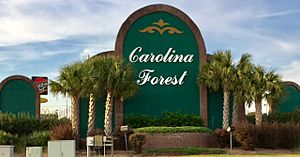Carolina Forest, South Carolina facts for kids
Quick facts for kids
Carolina Forest, South Carolina
|
|
|---|---|

Sign at the entrance to Carolina Forest at the intersection of US 501 and Carolina Forest Boulevard
|
|
| Country | United States |
| State | South Carolina |
| County | Horry |
| Area | |
| • Total | 17.29 sq mi (44.77 km2) |
| • Land | 16.82 sq mi (43.55 km2) |
| • Water | 0.47 sq mi (1.22 km2) |
| Elevation | 39 ft (12 m) |
| Population
(2020)
|
|
| • Total | 23,342 |
| • Density | 1,388.17/sq mi (535.97/km2) |
| Time zone | UTC-5 (EST) |
| ZIP Code |
29579 (Myrtle Beach)
|
| Area code(s) | 843 |
| FIPS code | 45-11833 |
Carolina Forest is a special kind of community called a census-designated place (CDP) in Horry County, South Carolina, United States. It was first officially counted as a CDP in the 2020 census. At that time, it had a population of 23,342 people.
This community is located west of Myrtle Beach and east of Conway. It was carefully planned by a company called International Paper in the late 1990s. Most of the buildings and areas you see today follow a big plan called the Carolina Forest Master Plan. This plan was created together by International Paper and the Horry County Government. Carolina Forest also includes a smaller, nearby community called Pine Island.
Contents
Exploring Carolina Forest's Location
Carolina Forest is found west of the Intracoastal Waterway. This is a long canal system that runs along the coast. The community sits between two main roads: U.S. Route 501 and International Drive.
Nature and Landscape
When Carolina Forest was built, it was designed around the natural areas already there. These included forests of Longleaf Pine trees and open, grassy areas called savannas. The land here is part of the Waccamaw River watershed, which means all the water in this area eventually flows into the Waccamaw River. This river then joins the larger Pee Dee River.
The land between the Waccamaw River and the Intracoastal Waterway has many unique spots called Carolina Bays. These are oval-shaped dips in the ground. They are often filled with thick plants and are home to many different kinds of animals and plants, making them rich in biodiversity.
The Story of Carolina Forest
Carolina Forest was once part of a much larger piece of land in eastern Horry County. This land was known as the Buist Tract.
From Forest to Community
Originally, the Buist Tract was owned by a company called Burroughs & Chapin. But in 1937, International Paper bought the land, which was about 30,000 acres (121 square kilometers). During World War II, part of this land was used as a training area for bombing and gunnery.
Later, in 1960, International Paper gave some of the land away. This land became what is now Coastal Carolina University, which is a few miles from Carolina Forest. In 1989, about 9,000 acres (36 square kilometers) to the north of Carolina Forest were given to the state to create the Lewis Ocean Bay Heritage Preserve. This preserve helps protect nature.
Building Schools and Roads
In June 1994, a small part of the remaining land, about 125 acres (0.5 square kilometers), was sold to Horry County Schools. This land was used to build Carolina Forest Elementary School, Carolina Forest Middle School, and Carolina Forest High School. Also, 350 acres (1.4 square kilometers) were sold to create a golf course and homes.
By the end of 1994, International Paper started selling more of its land. Because there wasn't enough money from other places to build roads, International Paper built the first 1.25 miles (2 kilometers) of Carolina Forest Boulevard themselves. This part of the road was finished by November 1995.
More roads were built, including expansions of Carolina Forest Boulevard and River Oaks Drive. These roads created an 11-mile (18-kilometer) loop. This loop opened up about 11,000 acres (45 square kilometers) for new homes and businesses west of the Intracoastal Waterway. Carolina Forest Boulevard was fully completed in December 1996, and River Oaks Drive was finished in December 1997.
Planning for the Future
On December 2, 1997, the Horry County council made an important decision. They voted to keep the rules for building in an 11-square-mile (28-square-kilometer) area of Carolina Forest the same for 20 years. In return, International Paper gave land to the county for parks and roads. About 35,000 people were expected to live in this area.
As part of this agreement, Horry County did not require International Paper to make Carolina Forest Boulevard or River Oaks Drive wider. Land was also given to the county for free for the future SC Highway 31, a major road. About 140 acres (0.57 square kilometers) were set aside for future schools, including Ocean Bay Elementary and Middle Schools. Because almost half of Carolina Forest was planned as open space, it didn't need to follow future rules about open space set by Horry County.
According to the 2010 census, Carolina Forest grew a lot. Its population increased from 3,400 people in 2000 to 21,000 people in 2010. By 2020, the population had grown to 23,342.
Learning in Carolina Forest
Carolina Forest has a public library, which is a part of the Horry County Memorial Library system. This library offers books, computers, and other resources for everyone in the community.
Images for kids
See also
 In Spanish: Carolina Forest para niños
In Spanish: Carolina Forest para niños
 | Delilah Pierce |
 | Gordon Parks |
 | Augusta Savage |
 | Charles Ethan Porter |




